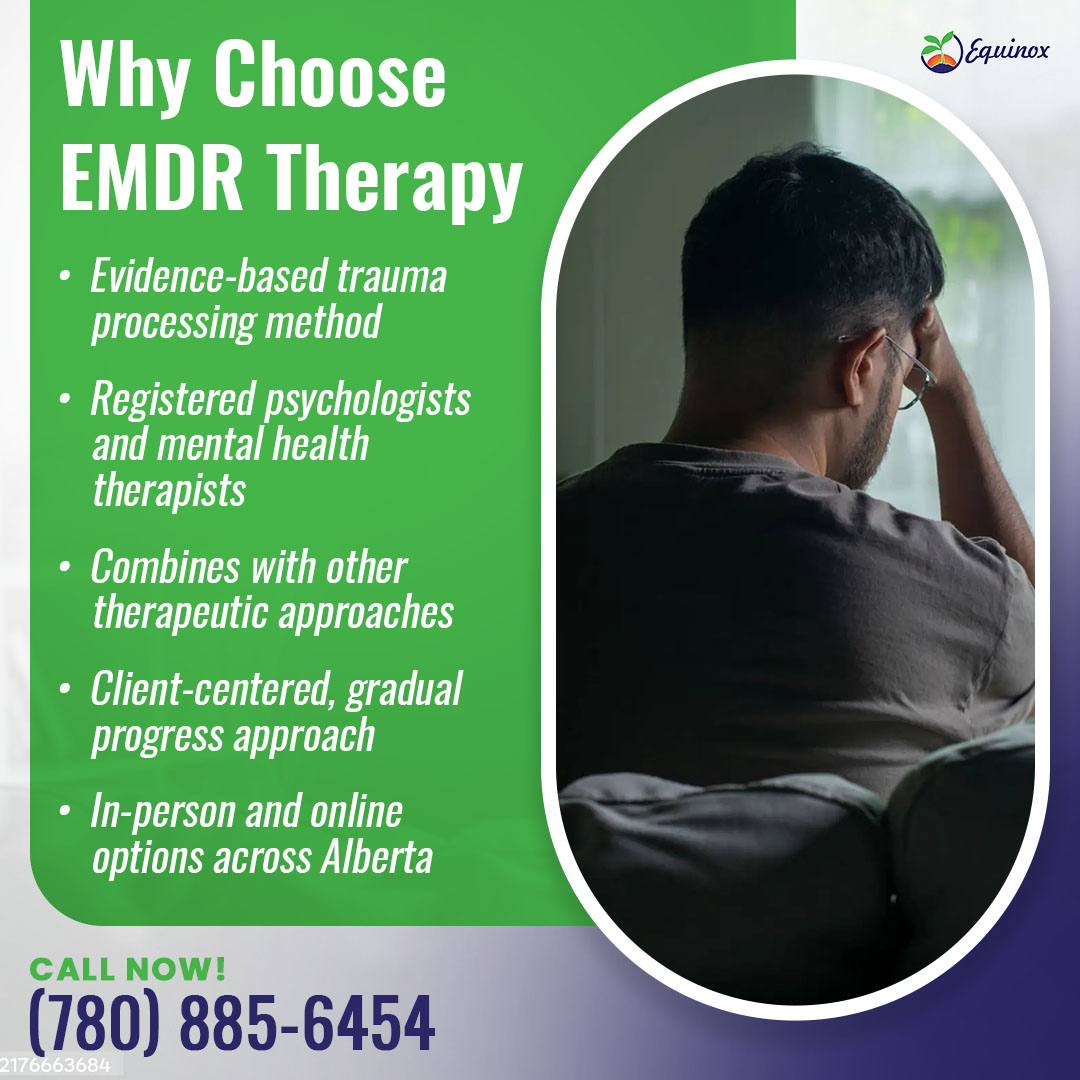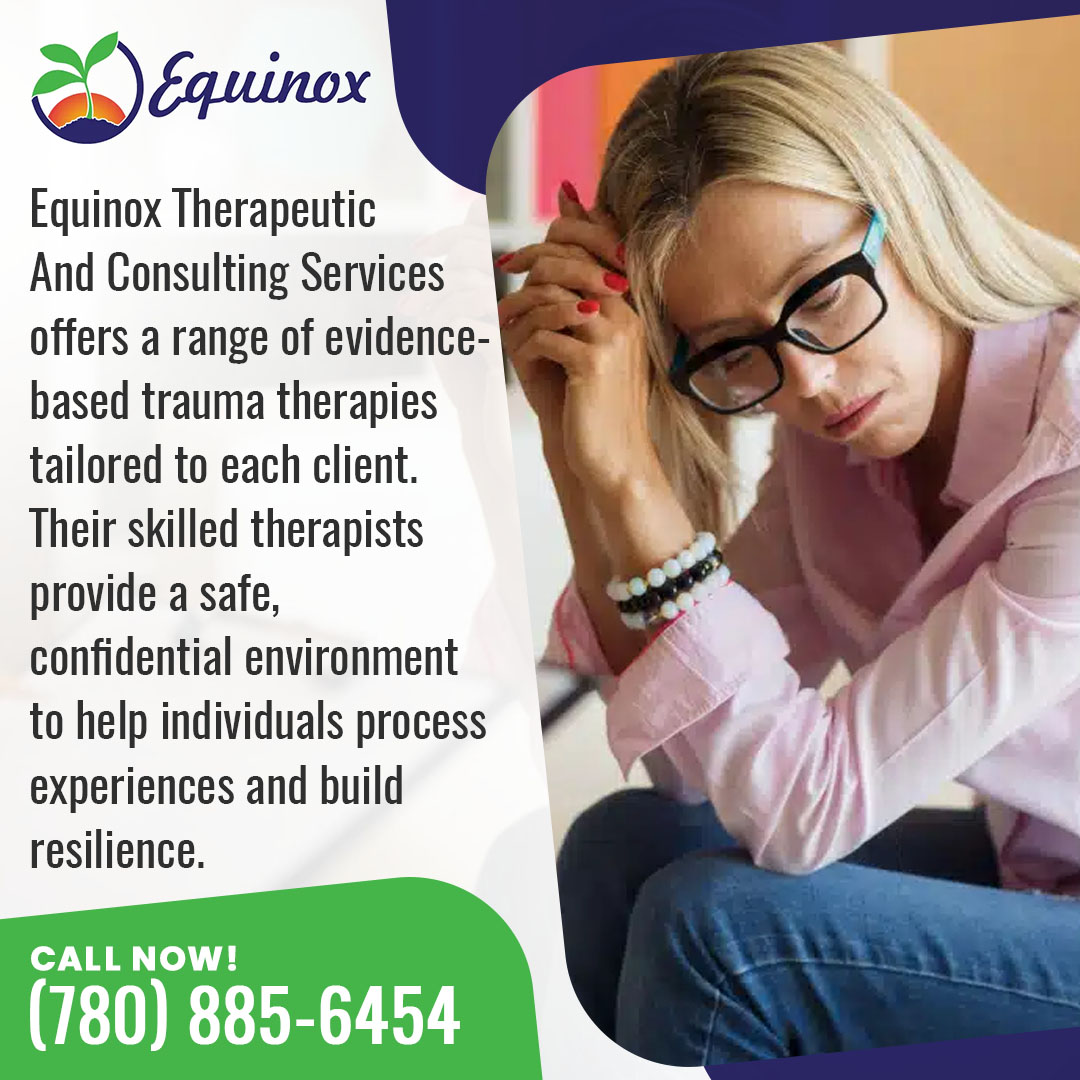Choosing the right therapist in Edmonton, AB, can be an important step for those seeking help with emotional or psychological difficulties. Whether you are interested in trauma therapy or trauma counselling in Edmonton, knowing what qualities to look for may help you connect with a professional who matches your needs. Therapists use different approaches and have various areas of expertise, which can affect the therapy experience. Equinox Therapeutic and Consulting Services offers access to registered psychologists and mental health practitioners who provide trauma-related care for clients in Edmonton. Here, we’ll outline important aspects to consider when selecting a therapist and highlight why the choice of therapist can influence your mental health support.

Recognizing the Need for Therapy: Signs and Considerations
Therapy can offer important support for many individuals facing emotional or psychological challenges. Recognizing when to consult a therapist in Edmonton often depends on personal signs and experiences that affect daily life.
What are common emotional and psychological challenges?
Feeling overwhelmed, sad, or anxious may suggest it’s time to consider therapy. These emotional states can interfere with how you function in everyday life. For instance, you might notice:
- Persistent sadness
- Ongoing anxiety
- Frequent panic attacks
- Difficulty managing anger
Many people struggle to manage intense emotions alone. If these symptoms begin to affect work, sleep, or relationships, it may help to consult a mental health professional. According to the Canadian Mental Health Association, 1 in 5 Canadians experience a mental health issue each year.
When might self-help strategies fall short?
Self-help methods can assist with mild stress or temporary issues, but sometimes professional support is necessary. Recognizing when self-help no longer suffices helps clarify when to contact a trauma psychologist in Edmonton or other specialized providers.
Self-help may fall short if symptoms persist or worsen over weeks. When personal efforts don’t alleviate distress, trauma therapy in Edmonton may offer specific techniques suited to individual needs. For example, ongoing flashbacks or nightmares that disrupt rest might require trauma counselling to address these issues effectively.
How can professional support assist with trauma and mental health concerns?
Professional therapy uses structured approaches aimed at managing complex emotional challenges. These methods can aid recovery and foster emotional strength. A trauma psychologist in Edmonton can apply evidence-based treatments to support healing from trauma and mental health concerns.
Trauma counselling often helps rebuild emotional safety and develop coping strategies over time. Working with a therapist allows you to explore difficult experiences safely and gain tools to manage symptoms that might otherwise feel overwhelming.
Practical Steps to Identify Qualified Therapists in Edmonton
Finding the right therapist involves careful consideration of qualifications and experience. Knowing how to evaluate these factors can help you connect with mental health professionals suited to your needs.
Reviewing Credentials and Licensing in Alberta
Therapists in Edmonton are required to hold valid licenses from Alberta’s regulatory bodies. For example, psychologists must be registered with the College of Alberta Psychologists. This registration indicates that the therapist has met standards related to education, training, and ethical practice.
Licensing helps confirm that a therapist follows professional guidelines designed to protect clients’ well-being. Checking these credentials can be a useful initial step when searching for trauma therapy in Edmonton or trauma counselling in Edmonton.
Understanding Therapist Specializations
Different titles indicate different levels of training and areas of focus. A psychologist usually holds a doctoral degree and specializes in diagnosing and treating mental health disorders. Counsellors may have a diploma or degree and often provide support focused on life challenges and coping skills.
The term “therapist” covers a range of professionals who offer counselling or psychotherapy, but it does not specify qualifications. Knowing these distinctions can guide you in selecting the most appropriate support, whether you are seeking trauma therapy in Edmonton or general mental health assistance.
The Role of Experience in Trauma and Mental Health Treatment
Experience working specifically with trauma and mental health conditions can shape the quality of care. Therapists who have treated trauma may recognize symptom patterns and stages of recovery more readily.
Many therapists in Edmonton openly share their areas of expertise and years of practice, helping you find someone experienced in trauma counselling or as a trauma psychologist in Edmonton. This transparency supports your search for a provider whose background aligns with your personal needs.
Assessing Therapist Fit Beyond Credentials
Choosing a therapist in Edmonton involves more than verifying qualifications. It’s important to consider how well you connect with the professional who will support you.
Evaluating Communication Style and Therapeutic Relationship
A therapist’s communication style can influence your comfort and progress. You want to feel that your thoughts and feelings are heard and respected. Some people prefer direct, straightforward feedback, while others benefit from a gentler approach. Reflect on how you like to express yourself and which style might suit you best.
The relationship with your therapist forms the foundation for effective trauma therapy in Edmonton. Feeling safe and understood may support steady progress in your healing.
Cultural Competency and Sensitivity in Therapy Sessions
Cultural sensitivity is an important aspect of trauma counselling in Edmonton. The city’s diverse population includes many cultural backgrounds and languages. A trauma psychologist in Edmonton who respects and understands these differences may provide care that feels relevant and respectful to your life experience. Cultural awareness can foster trust and create a space where you feel comfortable sharing personal challenges.
Flexibility in Scheduling and Therapy Delivery
Scheduling flexibility and therapy format options can help meet your needs. Some people prefer in-person sessions, which can support connection and focus. Others opt for virtual sessions to better fit therapy into their daily lives or for accessibility reasons. Many therapists in Edmonton offer both in-person and online trauma therapy to make services easier to access and adapt to your lifestyle.
The Impact of Trauma Therapy and Trauma Counselling on Recovery
Trauma therapy and trauma counselling in Edmonton can play a considerable role in healing, though the path is often complex and personal.
Unique Challenges of Trauma Recovery
Trauma recovery often involves dealing with ongoing fear, heightened alertness, and emotional numbness. These symptoms can interfere with daily activities, relationships, and work life. For example, someone might find it difficult to feel safe in social settings or struggle with concentration at work. The length of recovery varies greatly from person to person. It often requires a steady approach and strategies designed specifically for trauma.
How Trauma Psychologists Support Emotional Regulation and Healing
Trauma psychologists in Edmonton work with clients to develop skills for managing intense emotions. They may introduce grounding exercises that help you stay present during moments of distress or mindfulness practices to reduce anxiety. Gradual exposure to traumatic memories in a controlled way can allow you to face difficult experiences without feeling overwhelmed. These methods aim to help you regain a sense of control over your reactions.
The Importance of Patient-Centered Goal Setting in Trauma Therapy
Setting therapy goals based on your personal needs can improve the therapy experience and results. When you collaborate with your therapist, you can focus on issues that matter most to you, such as reducing nightmares or rebuilding trust in others. Many trauma therapists in Edmonton involve clients closely in this process, creating goals that reflect your unique journey toward healing.
Practical Tips for Your Initial Therapy Appointment
Starting therapy can feel like a big step. Preparing ahead can help you get the most out of your initial session with a therapist in Edmonton.
Preparing Questions and Concerns to Discuss
It helps to bring a list of your symptoms, experiences, and questions to your initial appointment. This gives your therapist a clearer picture of what you’re facing and what you hope to work on. You might want to ask about the types of therapy offered, such as trauma therapy in Edmonton, or how often sessions usually occur. Sharing details like sleep troubles, mood changes, or triggers can guide your therapist in tailoring the approach to your situation.
Understanding Therapy Confidentiality and Ethics
Therapy conversations stay private, with a few important exceptions. Your therapist will explain these limits early on, such as situations involving safety risks or legal obligations. Knowing these boundaries can help you feel more open in sharing sensitive information during trauma counselling in Edmonton. This transparency often builds trust, making it easier to explore difficult topics.
How to Evaluate If a Therapist Is Right for You
After a few meetings, take note of how comfortable you feel with your therapist. A trauma psychologist in Edmonton should listen carefully without judging and explain things clearly. If you feel unsure or uneasy after multiple sessions, look at other therapists. Therapy is a personal journey, and finding the right fit can influence your progress.
How Equinox Therapeutic And Consulting Services Support Your Journey
Equinox provides trauma therapy in Edmonton that aims to reflect each client’s unique needs and pace. Our therapists strive to personalize care to align with individual experiences and work toward creating a supportive and adaptable environment for healing.
Recovering from trauma is often a complex process. Equinox understands that no two journeys are the same. Our trauma counselling in Edmonton, AB, takes this into account by adapting therapy approaches to your symptoms and goals where appropriate. Whether you’re dealing with flashbacks, anxiety, or difficulties in emotional regulation, the therapy is shaped around what feels most helpful to you.
Tailored Trauma Therapy and Counselling Services
The trauma therapy and counselling provided by Equinox are designed to meet you where you are. Instead of a fixed treatment plan, therapists work collaboratively with you to explore ways to address your concerns.
At Equinox, trauma counselling in Edmonton is not about rushing progress. You can expect a pace that respects your comfort level and the timing that suits your recovery process. This might mean focusing on coping strategies initially, then gradually addressing deeper issues as you feel ready. This personalized method allows you to take ownership of your healing and engage in therapy in a way that feels natural.

The Role of Registered Psychologists and Mental Health Professionals
Equinox is staffed by licensed professionals, including trauma psychologists, who bring focused training and experience in supporting trauma recovery. Our therapists use evidence-based approaches designed to support emotional healing and build resilience.
Working with a trauma psychologist in Edmonton at Equinox may provide support with managing difficult symptoms and developing strategies to help with emotional regulation. Our training enables us to tailor therapy to your unique story and needs, helping to guide you through challenges while respecting your experiences.
Take the Next Step in Your Healing Journey with Equinox Services!
If you are looking for compassionate trauma therapy in Edmonton tailored to your needs, Equinox Therapeutic And Consulting Services is here to support you. Reach out today at (780) 885-6454 or email [email protected] to connect with our experienced therapists and begin a path toward recovery. We look forward to partnering with you on your journey to emotional well-being.




